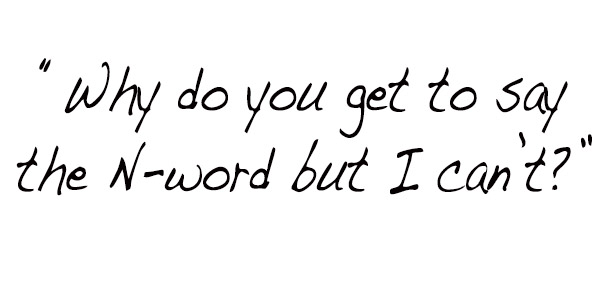In the tapestry of human interactions, language plays a pivotal role in shaping our perception of others and the world around us. However, there are certain words that carry a weight and legacy of pain, prejudice, and dehumanization—words like the n-word. Confronting such offensive language requires courage, empathy, and a deep understanding of its harmful effects.

Image: perdocs.weebly.com
The n-word originated in the lexicon of slavery, serving as a weapon to degrade and subjugate people of African descent. Its usage perpetuated the insidious myth of black inferiority and the justification for centuries of systematic oppression. Even today, this word persists as a symbol of hate and division, carrying with it the scars of its racist past.
To combat the scourge of racism, it is essential to challenge the use of the n-word explicitly. Ignoring it or hoping it will fade away only prolongs the pain it inflicts. When someone utters this abhorrent term, we have a responsibility to confront it head-on, not for ourselves but for the generations who have endured its sting.
The act of confronting inappropriate language should not be confrontational but rather guided by empathy and education. Begin by calmly acknowledging the offense caused by the word and explaining its historical and contemporary significance. Share facts and statistics about the harm it perpetuates, both on an individual and societal level.
Emphasize that the n-word is not merely an expression of anger or frustration but a deeply hurtful slur that targets and dehumanizes people based on their race. It is a word that has been used to justify violence, segregation, and discrimination, leaving an enduring legacy of pain and trauma.
By providing education and context, we can help others understand the true consequences of their words. However, confrontation alone is not enough. We must also offer empathy, recognizing that ignorance and prejudice may be underlying factors.
Instead of shaming or vilifying individuals who use racist language, approach them with compassion and an open mind. Listen to their perspective, and try to understand their motivations. Help them see the error of their ways, and encourage them to unlearn the biases that perpetuate such hateful speech.
Confronting racism is an ongoing journey, one that requires courage, empathy, and unwavering determination. It is a journey that begins with challenging inappropriate language, creating a dialogue of understanding, and ultimately fostering a society where such offensive words are banished to the dustbin of history.
Remember, every time we confront racism, we take a step towards a more just and equitable world, a world where all people are treated with dignity and respect, regardless of their race or ethnicity.

Image: atlantablackstar.com
How To Get Someone To Say The N Word